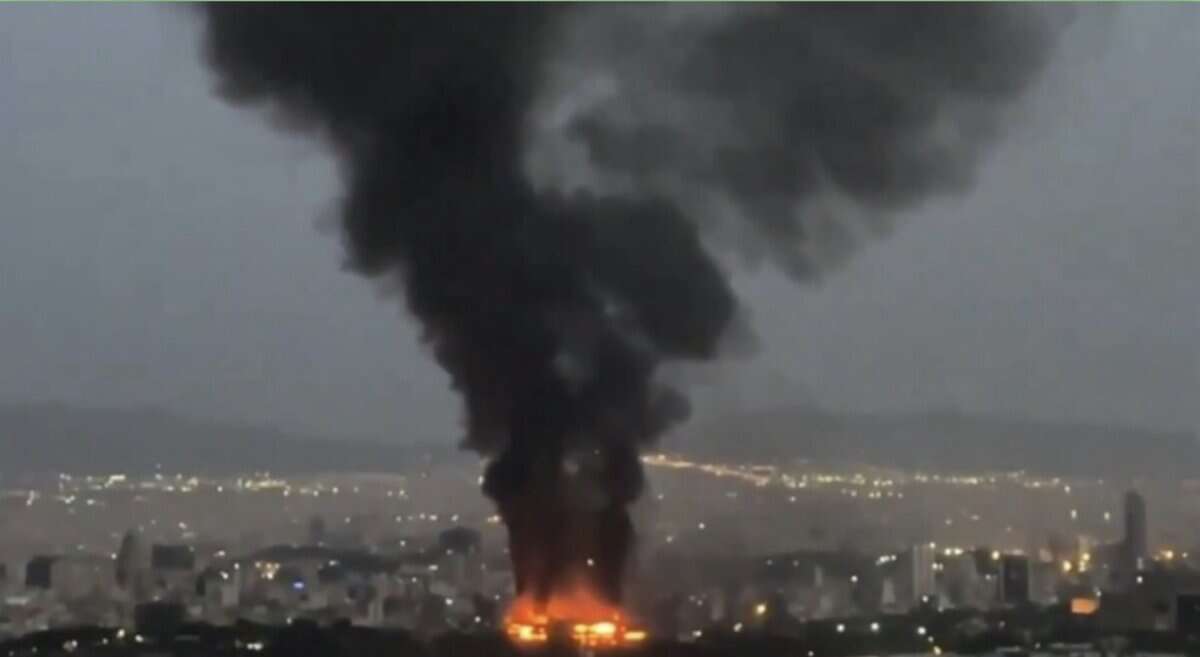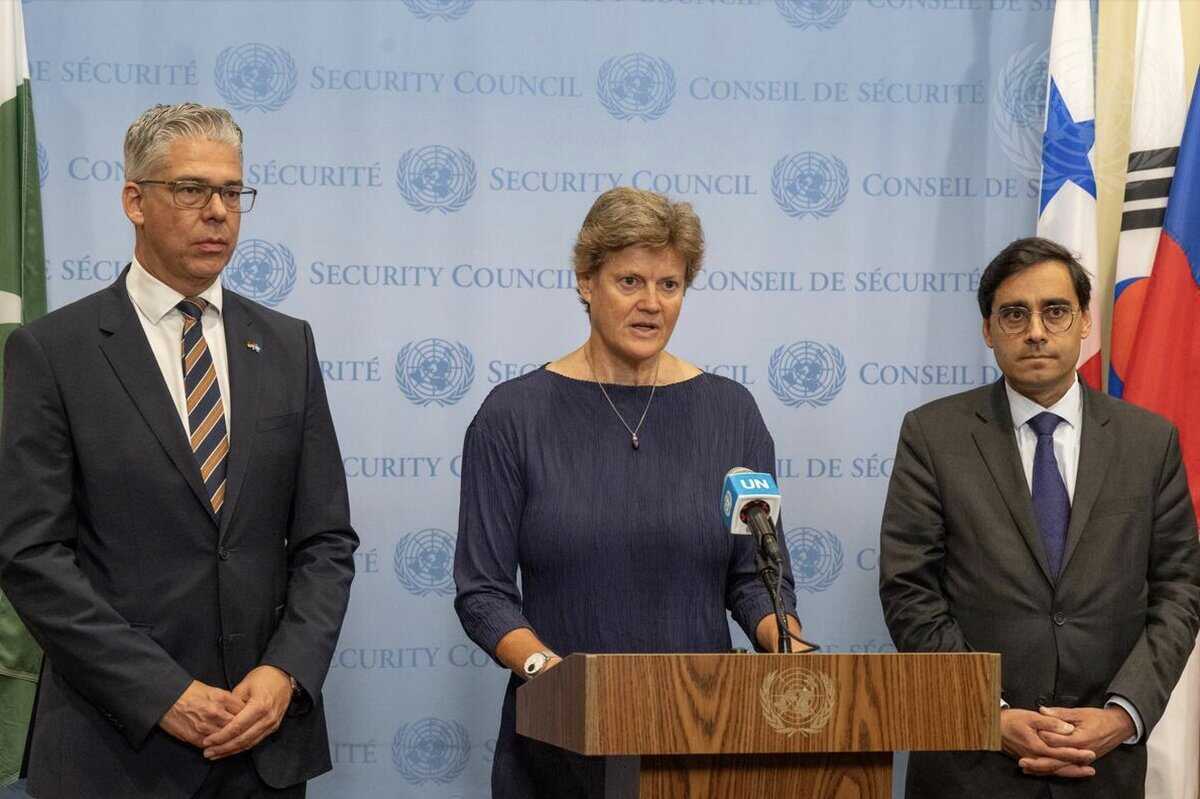 United States attacking Iranian nuclear facilities, June 22, 2025. Recently, Britain, France and Germany, the E3, triggered the snapback tool of the Iran nuclear deal, of which they are a party and the US withdrew from under the previous Trump administration in 2018. The essayist argues that the move by the E3 “lacks clarity and coherence” and could push Iran to leave the Nonproliferation Treaty. ANADOLU AGENCY
United States attacking Iranian nuclear facilities, June 22, 2025. Recently, Britain, France and Germany, the E3, triggered the snapback tool of the Iran nuclear deal, of which they are a party and the US withdrew from under the previous Trump administration in 2018. The essayist argues that the move by the E3 “lacks clarity and coherence” and could push Iran to leave the Nonproliferation Treaty. ANADOLU AGENCY
When the painstakingly negotiated Iran deal to limit the scope of the country’s nuclear program against sanctions relief was signed in Vienna on July 14, 2015, by Iran and the five permanent member of the United Nations Security Council as well as Germany and the European Union, a major achievement toward normalization of relations between the West, chiefly the United States, and Iran was in sight.
The Security Council adopted on July 20, 2015 Resolution 2231 endorsing the Joint Comprehensive Plan of Action (JCPOA), making it legally binding on its signatories and all other UN member states. Donald Trump’s ascension to the White House in January 2017, however, thwarted the prospect of detente between the West and Iran when he denounced the milestone agreement a year later.
The JCPOA is a complex, 150-page document, difficult for a layperson to grasp the references to nuclear technology. But what is easy to understand is the lack of a provision to withdraw from, or denounce, the agreement. That is why President Trump’s decision to “withdraw” from the JCPOA in his last term is a misnomer.
In fact, the US is in noncompliance with the JCPOA.
In 2015, France, Germany and Britain (E3) and the EU urged Trump to rescind his decision, to no avail. Iran nevertheless remained in compliance with its obligations for a whole year, according to the International Atomic Energy Agency (IAEA). Thereafter, Iran deemed itself no longer bound by an inoperative agreement and resumed — overtly — uranium enrichment above the 3.67 percent limit under the agreement.
On Aug. 28, 2025, the E3 informed the Security Council “that, based on clear factual evidence, the E3 believe Iran to be in significant non-performance of its commitments under the JCPOA, and hereby invoke the process known as the ‘Snapback mechanism’ pursuant to paragraph 11 of Resolution 2231.”
The agreement’s quasi-automatic mechanism to terminate the suspension of Security Council-imposed sanctions on Iran — a central plank of the JCPOA quid-pro-quo between Tehran and the other signatories — expires on Oct. 18, 2025. It is no coincidence that the E3 decided to invoke the snapback mechanism at this juncture as it requires a 30-day notification period. The window was closing fast, as the E3 attempt to pressure Iran to make concessions regarding its nuclear program.
Additionally, Russia will hold the rotating presidency of the Security Council in October, so the E3 wanted to act before Russia could try to control the snapback process.
Iran’s reaction was predictable. It castigated the E3 decision as “a political act and in opposition to the Islamic Republic,” yet it chose diplomatic ambiguity. It asserted that the US and Israeli strikes on its nuclear facilities undermined the legal and political basis of the JCPOA but remained committed to the deal in spite of “gross violations” by Washington and the European signatories, which forced Iran to “gradually reduce its commitments.”
But the EU invoking the snapback lacks clarity and coherence.
First, the noncompliance by Iran of its JCPOA undertakings was never secret. On the contrary, Tehran had boastfully heralded since 2021 its capacity to enrich uranium to 60 percent (and implicitly to 90 percent weapons-grade level). Its nuclear facilities had nevertheless remained under IAEA safeguards and subject to intrusive inspections.
Iran’s stockpiles of fissile material were accounted for by the agency until the wanton strikes of the US and Israel in June 2025 against active nuclear facilities. Whether Iran was in noncompliance of its JCPOA obligations or, for that matter, its Nonproliferation Treaty obligations, these acts of war constitute utmost grave violations of international law.
Coherence would have impelled the E3 to invoke the snapback mechanism years ago, as the US had already attempted to do so in August 2020. Then, European resistance to the Trump administration prevailed, and the Security Council rejected Washington’s move to trigger the snapback mechanism because it was no longer deemed a party to the JCPOA.
Today, however, the US-Europe relationship has shifted dramatically, a process that started under the Biden administration pertaining to the war in Ukraine. The trans-Atlantic alliance has morphed into, largely, a perception of subservience as the demeaning photograph on Aug. 18 of major European leaders and NATO Secretary-General Mark Rutte seated like schoolchildren in front of Trump behind his “Resolute Desk” in the Oval Office. Contrast this image with the iconic picture of German Chancellor Angela Merkel at the 2018 G-7 Summit where, standing before the seated, crossed-armed Trump, the conclusion is plain to see.
Second, the incongruity of the legal status of the JCPOA is problematic. The E3 and others, including the US, think that the agreement is still in force. On a strictly legal plane, this argument is valid on at least two grounds. It is set to expire 15 years from its entry-into-force day, and having been endorsed by the Security Council, it has an internationally binding legal weight even if it is not a formal treaty.
One the one hand, the E3 argue that just because the US ended it participation, Iran is not absolved of its obligations under the JPCOA. Prima facie, this proposition is correct. But if valid, it ought to be equally valid if the UK also ended its participation. The same goes for France and Germany.
Legally flawed thinking
This is when the argument becomes legally flawed and politically fallacious because it omits the centrality of the JCPOA: in law, it is a multilateral agreement, but politically, it is a bilateral accord between Iran and all other signatories. It may have survived any signatory denouncing it but for the US and Iran. Expecting Tehran to meet its undertakings while Washington has reinstated crippling economic and financial sanctions, and more recently attacked it militarily, lacks understanding, honesty and logic.
On the other hand, would the E3 accept that Iran would no longer be bound by the JCPOA, just as the US, if it decided to end its participation? The answer is obviously no.
When the US dropped 12 30,000-pound GBU-57A/B bunker buster bombs on June 22, 2025, which “completely and totally obliterated” Iran’s main nuclear enrichment facility at Fordow, according to Trump, this act of war, in and of itself, buried not only Iran’s most advanced cascades of centrifuges and possibly some 400 kilograms of 60 percent enriched uranium, but the JCPOA itself.
 Barbara Woodward, permanent representative of the UK to the UN, briefing reporters on the E3’s announcement triggering the snapback mechanism of the Iran nuclear deal, saying the country is in noncompliance with the JCPOA, as it’s known. Ricklef Beutin, ambassador for Germany, left, and Jay Dharmadhikari, deputy permanent representative for France, Aug. 29, 2025. ESKINDER DEBEBE/UN PHOTO
Barbara Woodward, permanent representative of the UK to the UN, briefing reporters on the E3’s announcement triggering the snapback mechanism of the Iran nuclear deal, saying the country is in noncompliance with the JCPOA, as it’s known. Ricklef Beutin, ambassador for Germany, left, and Jay Dharmadhikari, deputy permanent representative for France, Aug. 29, 2025. ESKINDER DEBEBE/UN PHOTO
Whatever one believes of its nuclear program or intent, Tehran made a critical concession by undertaking not to enrich uranium above 3.67 percent — critical because the NPT, to which it is (still) a party, guarantees nuclear enrichment as a sovereign right and does not limit enrichment levels.
While the US was not in compliance with its JCPOA commitments, Iran remained so up to a year after Trump’s momentous decision, according to the IAEA. Expecting Tehran to remain in compliance thereafter defies logic.
The E3 decision to trigger the snapback mechanism under a moribund, or defunct, JCPOA is unsound policy that can only worsen tensions. If its intent is to compel Iran to seek a diplomatic solution, which it was considering until the eve of Washington’s military aggression, this result is highly unlikely in the short- or medium-term.
A more likely outcome, however, is pushing Iran over the brink: deciding to withdraw, as it can rightfully do, from the NPT. Under Article 10, “Each Party shall in exercising its national sovereignty have the right to withdraw from the Treaty if it decides that extraordinary events, related to the subject matter of this Treaty, have jeopardized the supreme interests of its country.”
If nuclear nonproliferation is truly what the US and its allies are seeking, the pursuit of a nuclear-weapon-free-zone in the Mideast, which also requires the nuclear disarmament of Israel, ought to be their priority.
Exerting extreme pressure on Iran is most likely to backfire. It did so in the case of North Korea, which withdrew from the NPT in 2003 to become the world’s ninth nuclear-weapons power. By cornering Tehran, the E3 gambit could dramatically backfire with unintended consequences — including pushing the entire NPT regime over the edge.
This is an opinion essay.
We welcome your comments on this article. What are your thoughts on the E3 triggering the snapback?
![]()
Moncef Khane is a former United Nations official who served as political director of the Office of the Joint Special Envoy for Syria (2012-2014), as well as in peacekeeping missions and in the Executive Office of Secretary-General Kofi Annan.